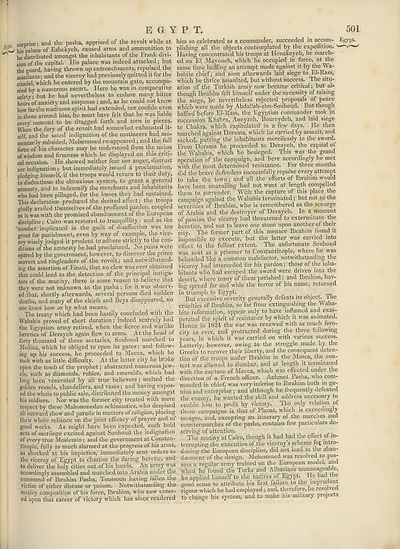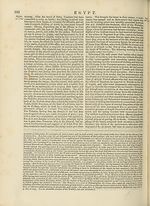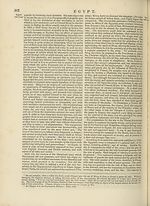Encyclopaedia Britannica > Volume 8, DIA-England
(511) Page 501
Download files
Complete book:
Individual page:
Thumbnail gallery: Grid view | List view

1
EGYPT. 501
surprise; and the pasha, apprised of the revolt while at
his palace of Ezbekyeh, caused arms and ammunition to
^ he distributed amongst the inhabitants of the Frank divi¬
sion of the capital. His palace was indeed attacked ; but
the guard, having thrown up entrenchments, repulsed the
assailants; artd the viceroy had previously quitted it for the
citadel, which he entered by the mountain gate, accompa¬
nied by a numerous escort. Here he was in comparative
safety; but he had nevertheless to endure many bitter
hours of anxiety and suspense ; and, as he could not know
how far the mutinous spirit had extended, nor confide even
in those around him, he must have felt that he was liable
every' moment to be dragged forth and torn in pieces.
When the fury of the revolt had somewhat exhausted it¬
self, and the sated indignation of the mutineers had mo¬
mentarily subsided, Mehemmed re-appeared ; and the full
force of his character may be understood from the union
of wisdom and firmness which he displayed on this criti¬
cal occasion. He showed neither fear nor anger, distrust
nor indignation; but immediately issued a proclamation,
pledging himself, if the troops would return to their duty,
to disdontinue the obnoxious system, to grant a general
amnesty, and to indemnify the merchants and inhabitants
who had been pillaged, for the losses they had sustained.
This declaration produced the desired effect; the troops
gladly availed themselves of the proffered pardon, coupled
as it was with the promised abandonment of the European
discipline; Cairo was restored to tranquillity; and as the
number implicated in the guilt of disafrection was too
great for punishment, even by way of example, the vice¬
roy wisely judged it prudent to adhere strictly to the con¬
ditions of the amnesty he had proclaimed. No pains were
spared by the government, however, to discover the prime
movers and ringleaders of the revolt; and notwithstand¬
ing the assertion of Finati, that no clew was ever obtained
that could lead to the detection of the principal instiga¬
tors of the mutiny, there is some reason to believe that
they were not unknown to the pasha; for it was observ¬
ed that, shortly afterwards, several persons died sudden
deaths, and many of the chiefs and Beys disappeared, no
one knew how or by what means.
The treaty which had been hastily concluded with the
Wahabis proved of short duration; indeed scarcely had
the Egyptian army retired, when the fierce and warlike
heretics of Derayeh again flew to arms. At the head of
forty thousand of these sectaries, Souhoud marched to
Medina, which he obliged to open its gates; and follow¬
ing up his success, he proceeded to Mecca, which he
took with as little difficulty. At the latter city he broke
open the tomb of the prophet; abstracted numerous jew¬
els, such as diamonds, rubies, and emeralds, which had
long been venerated by all true believers ; melted the
golden vessels, chandeliers, and vases ; and having expos¬
ed the whole to public sale, distributed the money amongst
his soldiers. Nor was the former city treated with more
respect by these Mahommedan schismatics, who despised
all outward show and parade in matters of religion, placing^
their whole reliance on the joint efficacy of prayer and of
good works. As might have been expected, such bold
acts of sacrilege excited against Souhoud the indignation
of every true Moslemin ; and the government at Constan¬
tinople, fully as much alarmed at the progress of his arms,
as shocked at his impieties, immediately sent orders to
the viceroy of Egypt to chastise the daring heretic, and
to deliver the holy cities out of his hands. An army was
accordingly assembled and marched into Arabia under the
command of Ibrahim Pasha, Toussoun having fallen the
victim of either disease or poison. Notwithstanding the
niotley composition of his force, Ibrahim, who now enter¬
ed upon that career of victory which has since rendered
him so celebrated as a commander, succeeded in accom- Egypt,
plishing all the objects contemplated by the expedition,
Having concentrated his troops at Henakeyeh, he march¬
ed on El Mayoueh, which he occupied in force, at the
same time baffling an attempt made against it by the Wa¬
habite chief; and soon afterwards laid siege to El-Rass,
which he thrice assaulted, but without success. The situ¬
ation of the Turkish army now became critical; but al¬
though Ibrahim felt himself under the necessity of raising
the siege, he nevertheless rejected proposals of peace
which were made by Abdallah-ebn-Souhoud. But though
baffled before El-llass, the Egyptian commander took in
succession Khabra, Aneyzeh, Boureydeh, and laid siege
to Chakra, which capitulated in a few days. He then
marched against Dorama, which he carried by assault, and
sacked, putting the inhabitants mercilessly to the sword._
From Dorama he proceeded to Derayeh, the capital of
the Wahabis, which he besieged. This was the grand
operation of the campaign, and here accordingly he met
with the most determined resistance. For three months
did the brave defenders successfully repulse every attempt
to take the town; and all the efforts of Ibrahim would
have been unavailing had not want at length compelled
them to surrender. With the capture of this place the
campaign against the Wahabis terminated ; but not so the
severities of Ibrahim, who is remembered as the scourge
of Arabia and the destroyer of Derayeh. In a moment
of passion the viceroy had threatened to exteiminate the
heretics, and not to leave one stone upon another of then-
city. The former part of this menace Ibrahim found it
impossible to execute, but the latter was cairied into
effect to the fullest extent. The unfortunate Souhoud
was sent as a prisoner to Constantinople, where he was
beheaded like a common malefactor, notwithstanding the
viceroy had interceded for his pardon ; those of the inha¬
bitants who had escaped the sword were driven into the
desert, where many of them perished; and Ibrahim, hav¬
ing spread far and wide the terror of his name, returned
in triumph to Egypt. ,
But excessive severity generally defeats its object. I he
cruelties of Ibrahim, so far from extinguishing the Waha¬
bite reformation, appear only to have, inflamed and exas¬
perated the spirit of resistance by which it was animated.
Hence in 1824 the war was renewed with as much fero¬
city as ever, and protracted during the three following
years, in which it was carried on with various success.
Latterly, however, owing to the struggle made by the
Greeks to recover their liberty, and the consequent deten¬
tion of the troops under Ibrahim in the Morea, the con¬
test was allowed to slumber, and at length it terminated
with the capture of Mecca, which was effected under the
direction of a French officer. Achmet Pasha, who.com¬
manded in chief, was very inferior to Ibrahim both in ge¬
nius and enterprise ; and although he frequently defeated
the enemy, he wanted the skill and address necessary to.
enable him to profit by victory. The only relation of
these campaigns is that of Planat, which is exceedingly
meagre, and, excepting an itinerary of the marches and
countermarches of the pasha* contains few particulars de-
serving of attention. .
The mutiny at Cairo, though it had had the effect of in¬
terrupting the execution of the viceroy’s scheme foe intro¬
ducing the European discipline, did not lead to the aban¬
donment of the design. Mehemmed was resolved to pos¬
sess a regular army trained on the European model, and
when he found the Turks and Albanians unmanageable,
he applied himself to the natives of Egypt. He had the
good sense to attribute his first failure to the imprudent
rigour which he had employed ; and, therefore, he lesolve
to change his system, and to make his military projects
EGYPT. 501
surprise; and the pasha, apprised of the revolt while at
his palace of Ezbekyeh, caused arms and ammunition to
^ he distributed amongst the inhabitants of the Frank divi¬
sion of the capital. His palace was indeed attacked ; but
the guard, having thrown up entrenchments, repulsed the
assailants; artd the viceroy had previously quitted it for the
citadel, which he entered by the mountain gate, accompa¬
nied by a numerous escort. Here he was in comparative
safety; but he had nevertheless to endure many bitter
hours of anxiety and suspense ; and, as he could not know
how far the mutinous spirit had extended, nor confide even
in those around him, he must have felt that he was liable
every' moment to be dragged forth and torn in pieces.
When the fury of the revolt had somewhat exhausted it¬
self, and the sated indignation of the mutineers had mo¬
mentarily subsided, Mehemmed re-appeared ; and the full
force of his character may be understood from the union
of wisdom and firmness which he displayed on this criti¬
cal occasion. He showed neither fear nor anger, distrust
nor indignation; but immediately issued a proclamation,
pledging himself, if the troops would return to their duty,
to disdontinue the obnoxious system, to grant a general
amnesty, and to indemnify the merchants and inhabitants
who had been pillaged, for the losses they had sustained.
This declaration produced the desired effect; the troops
gladly availed themselves of the proffered pardon, coupled
as it was with the promised abandonment of the European
discipline; Cairo was restored to tranquillity; and as the
number implicated in the guilt of disafrection was too
great for punishment, even by way of example, the vice¬
roy wisely judged it prudent to adhere strictly to the con¬
ditions of the amnesty he had proclaimed. No pains were
spared by the government, however, to discover the prime
movers and ringleaders of the revolt; and notwithstand¬
ing the assertion of Finati, that no clew was ever obtained
that could lead to the detection of the principal instiga¬
tors of the mutiny, there is some reason to believe that
they were not unknown to the pasha; for it was observ¬
ed that, shortly afterwards, several persons died sudden
deaths, and many of the chiefs and Beys disappeared, no
one knew how or by what means.
The treaty which had been hastily concluded with the
Wahabis proved of short duration; indeed scarcely had
the Egyptian army retired, when the fierce and warlike
heretics of Derayeh again flew to arms. At the head of
forty thousand of these sectaries, Souhoud marched to
Medina, which he obliged to open its gates; and follow¬
ing up his success, he proceeded to Mecca, which he
took with as little difficulty. At the latter city he broke
open the tomb of the prophet; abstracted numerous jew¬
els, such as diamonds, rubies, and emeralds, which had
long been venerated by all true believers ; melted the
golden vessels, chandeliers, and vases ; and having expos¬
ed the whole to public sale, distributed the money amongst
his soldiers. Nor was the former city treated with more
respect by these Mahommedan schismatics, who despised
all outward show and parade in matters of religion, placing^
their whole reliance on the joint efficacy of prayer and of
good works. As might have been expected, such bold
acts of sacrilege excited against Souhoud the indignation
of every true Moslemin ; and the government at Constan¬
tinople, fully as much alarmed at the progress of his arms,
as shocked at his impieties, immediately sent orders to
the viceroy of Egypt to chastise the daring heretic, and
to deliver the holy cities out of his hands. An army was
accordingly assembled and marched into Arabia under the
command of Ibrahim Pasha, Toussoun having fallen the
victim of either disease or poison. Notwithstanding the
niotley composition of his force, Ibrahim, who now enter¬
ed upon that career of victory which has since rendered
him so celebrated as a commander, succeeded in accom- Egypt,
plishing all the objects contemplated by the expedition,
Having concentrated his troops at Henakeyeh, he march¬
ed on El Mayoueh, which he occupied in force, at the
same time baffling an attempt made against it by the Wa¬
habite chief; and soon afterwards laid siege to El-Rass,
which he thrice assaulted, but without success. The situ¬
ation of the Turkish army now became critical; but al¬
though Ibrahim felt himself under the necessity of raising
the siege, he nevertheless rejected proposals of peace
which were made by Abdallah-ebn-Souhoud. But though
baffled before El-llass, the Egyptian commander took in
succession Khabra, Aneyzeh, Boureydeh, and laid siege
to Chakra, which capitulated in a few days. He then
marched against Dorama, which he carried by assault, and
sacked, putting the inhabitants mercilessly to the sword._
From Dorama he proceeded to Derayeh, the capital of
the Wahabis, which he besieged. This was the grand
operation of the campaign, and here accordingly he met
with the most determined resistance. For three months
did the brave defenders successfully repulse every attempt
to take the town; and all the efforts of Ibrahim would
have been unavailing had not want at length compelled
them to surrender. With the capture of this place the
campaign against the Wahabis terminated ; but not so the
severities of Ibrahim, who is remembered as the scourge
of Arabia and the destroyer of Derayeh. In a moment
of passion the viceroy had threatened to exteiminate the
heretics, and not to leave one stone upon another of then-
city. The former part of this menace Ibrahim found it
impossible to execute, but the latter was cairied into
effect to the fullest extent. The unfortunate Souhoud
was sent as a prisoner to Constantinople, where he was
beheaded like a common malefactor, notwithstanding the
viceroy had interceded for his pardon ; those of the inha¬
bitants who had escaped the sword were driven into the
desert, where many of them perished; and Ibrahim, hav¬
ing spread far and wide the terror of his name, returned
in triumph to Egypt. ,
But excessive severity generally defeats its object. I he
cruelties of Ibrahim, so far from extinguishing the Waha¬
bite reformation, appear only to have, inflamed and exas¬
perated the spirit of resistance by which it was animated.
Hence in 1824 the war was renewed with as much fero¬
city as ever, and protracted during the three following
years, in which it was carried on with various success.
Latterly, however, owing to the struggle made by the
Greeks to recover their liberty, and the consequent deten¬
tion of the troops under Ibrahim in the Morea, the con¬
test was allowed to slumber, and at length it terminated
with the capture of Mecca, which was effected under the
direction of a French officer. Achmet Pasha, who.com¬
manded in chief, was very inferior to Ibrahim both in ge¬
nius and enterprise ; and although he frequently defeated
the enemy, he wanted the skill and address necessary to.
enable him to profit by victory. The only relation of
these campaigns is that of Planat, which is exceedingly
meagre, and, excepting an itinerary of the marches and
countermarches of the pasha* contains few particulars de-
serving of attention. .
The mutiny at Cairo, though it had had the effect of in¬
terrupting the execution of the viceroy’s scheme foe intro¬
ducing the European discipline, did not lead to the aban¬
donment of the design. Mehemmed was resolved to pos¬
sess a regular army trained on the European model, and
when he found the Turks and Albanians unmanageable,
he applied himself to the natives of Egypt. He had the
good sense to attribute his first failure to the imprudent
rigour which he had employed ; and, therefore, he lesolve
to change his system, and to make his military projects
Set display mode to:
![]() Universal Viewer |
Universal Viewer | ![]() Mirador |
Large image | Transcription
Mirador |
Large image | Transcription
Images and transcriptions on this page, including medium image downloads, may be used under the Creative Commons Attribution 4.0 International Licence unless otherwise stated. ![]()
| Encyclopaedia Britannica > Encyclopaedia Britannica > Volume 8, DIA-England > (511) Page 501 |
|---|
| Permanent URL | https://digital.nls.uk/193329648 |
|---|
| Attribution and copyright: |
|
|---|
| Description | Ten editions of 'Encyclopaedia Britannica', issued from 1768-1903, in 231 volumes. Originally issued in 100 weekly parts (3 volumes) between 1768 and 1771 by publishers: Colin Macfarquhar and Andrew Bell (Edinburgh); editor: William Smellie: engraver: Andrew Bell. Expanded editions in the 19th century featured more volumes and contributions from leading experts in their fields. Managed and published in Edinburgh up to the 9th edition (25 volumes, from 1875-1889); the 10th edition (1902-1903) re-issued the 9th edition, with 11 supplementary volumes. |
|---|---|
| Additional NLS resources: |
|

